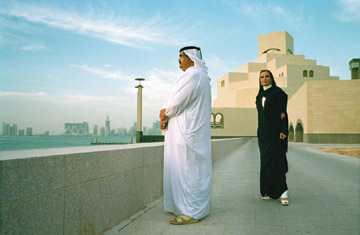
PARTNERS: Emir Hamad and Sheika Mozah pose for a rare portrait beside I.M. Pei's Museum of Islamic Art in Doha
The Emir of Qatar leans back on a cream leather sofa and puffs on a cigar as his luxury yacht Maracunda plies the country's coastline. Sheik Hamad bin Khalifa al-Thani is having a weekend at sea, relaxing with his family and a few guests, chatting about everything from Qatar's bygone pearl-diving industry to Middle East peace. With staterooms sleeping just 14, the 61-m vessel is relatively modest as royal perks go — especially considering that the small country Hamad rules is among the world's richest. Average income among Qataris is $75,900 a year and the Emir, 56, is estimated to be worth more than $1 billion. But his Bedouin origins are never far below the surface. As he tells a tale about his tribe, his wife, Sheika Mozah, jokes: "You were out there in the desert, when my tribe was a civilized tribe in the city." The Emir gives a hearty laugh.
The scene on the Maracunda is a glimpse into the world of the Gulf's supersheiks, who are losing their desert reserve and opening up to the world. Each with their own priorities and vision, the new generation of leaders in the Gulf are inviting foreign business partners to their states, enfranchising their people and encouraging free speech. Together, they're making their sheikdoms the beating heart of 21st century Araby. For decades after Arab countries gained independence, Egypt, Saudi Arabia and Lebanon used, respectively, their military power, oil wealth and intellectual capital to dominate Arab agendas. Nowadays, Gulf rulers in cities like Doha, Dubai and Abu Dhabi set the pace for change in the Arab world, embracing globalization, turning themselves into cultural forces, and recognizing the importance of education if they are to play a key role in the century's story. There's no reason it can't be done. With fewer natural resources, Singapore and Hong Kong have become hubs of the global economy. Today's sheiks want their Gulf states to join the Asian tigers.
The transformation of Qatar, which has a population of 1 million, of whom three-quarters are foreign workers, will be the labor of generations. But its new skyscrapers, university buildings, research labs, sports arenas and museums — along with its restored bazaar — illustrate the legacy the Emir aspires to build. He and his wife seek to develop a country recognized for its excellence, open to the world yet true to its own Arab and Islamic heritage. "Oil and gas is going to finish someday, just like our pearl industry once came to an end," the Emir says. "So this nation's people should learn how they can live comfortable lives without oil and gas. This is our fight now."
Already, there is no other place in the Middle East quite like Qatar. The thumb-shaped patch of real estate half the size of Sicily is a peaceful oasis where the entire world sometimes seems to be making contact through diplomatic exchanges, economic powwows, sporting events and think-tank conferences. The country just opened its first church, recognizing the needs of its thousands of Christian expatriates. Qatar hosted the conference that started the Doha Round of world trade talks in 2001, was the site of the Asian Games in 2006 and is making a bid for the Olympic Games in 2016. And the state is the home of al-Jazeera news network, founded by the Emir in 1996.
Qatar has already come a very long way from the sleepy emirate Hamad inherited — or, to be more precise, seized from his father Sheik Khalifa in a bloodless coup in 1995. The Emir is jovial, yet formidable. As a Qatari who knows him well says, "He's very friendly, but very stubborn." After spending years fuming about the old Emir's erratic rule, tolerance of corruption and subservience to Saudi Arabia, Hamad made the move to forcibly retire his father. One of the new Emir's first acts was putting up the cash to sponsor al-Jazeera, which gave Arab audiences from Morocco to the Gulf the chance to receive independent news reports and freewheeling debates in their own language for the first time. "Our problem was with the Arab leaders," the Emir says. "There was no voice for the Arab people. Al-Jazeera was the right tool for the people to talk."
The Emir also began implementing a gradual democratization plan for Qatar — a break with tradition in a region where most hereditary rulers have long regarded themselves as the unaccountable owners of the land and its wealth. In 1999 Hamad held the country's first-ever ballot, for municipality council seats, and Qataris of both sexes will soon elect their first parliament. A constitution approved in 2003 enshrines the Emir's clan as Qatar's ultimate rulers, but provides for substantial parliamentary decision-making and oversight.
Oil — first when it was cheap, and now that it is expensive — has helped the Emir's plan. He took over a government that was basically broke, acquiring an empty national treasury at a time when the price was dipping below $10 per barrel. He has been able to maintain the momentum of reform during the long upswing in prices, rather than banking the windfall and returning to the lassitude of the past. Now Qatar's oil riches are augmented by its gas reserves, the world's third largest behind Russia and Iran. Qatar shipped its first tanker of liquefied natural gas (LNG) in 1997, and last year became the world's largest LNG exporter.